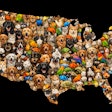Advertisements for a proposal to label genetically modified foods in Washington, USA, are causing confusion over whether or not the initiative would cover petfood and meats for human consumption. The fight over the wording of the proposal comes after a measure known as Proposition 37 was defeated in California, USA, in 2012, which had similar wording and major companies funding both sides of the proposal.
"Petfood would be covered but meat for human consumption would be exempt," said Dan Newhouse, a former state agriculture secretary, in recent commercials against I-522.
However, the I-522 measure reportedly does not mention petfood in the 2,448-word text. Though it exempts meat that has been fed or injected with genetically modified products from the labeling requirements, I-522 would require meat from a genetically modified animal to be labeled if sold in a supermarket.
The key point is that the initiative fails to define "food," said Rob Maguire, an attorney for the "No" campaign. According to Maguire, courts would look at the definition in Article 69 of state statutes, which deals with food labeling, along with the federal law and the common dictionary definition, all of which include petfood.
"That's just false," said Knoll Lowney, attorney for the "Yes" campaign, which argues petfood is not covered. The initiative would fall under Article 70, not Article 69, so the definition would not apply, according to Lowney. Courts would look first at the initiative, which says in the introductory section that its purpose is "to ensure people are fully informed about whether the food they purchase and eat was produced through genetic engineering," Lowney said.
Lowney and Maguire agree that petfood would only be required to be labeled if the state Health Department includes it in rules the agency must write if the initiative passes.
According to Lowney, a key difference is that California supporters of Proposition 37 wanted the law to cover petfood, whereas supporters of I-522 in Washington are only concerned with human food. I-522 supporters could not add specific language to exempt petfood because it cannot be changed once an initiative begins gathering signatures.
















